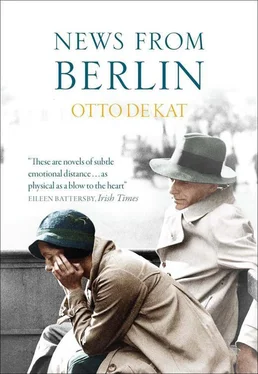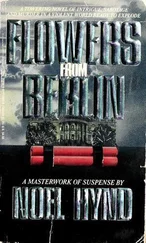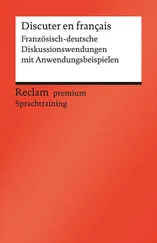“What was that about you whispering something?”
Her explanation shook her husband more than she had foreseen.
“My God, Emma, how could you? I told you in confidence!”
“I couldn’t help it, all I could think of was what you’d said, Carl. And he was so… it was as if he were worlds away, almost a stranger. I wanted him to know what we know. Only three more weeks. And so I told him, and he was back with his feet on the ground straightaway. I hope he’ll do something with it. He must.”
Carl said nothing. The warning they had received today was impossible to take lightly. Emma’s arrest, albeit brief, was a threat of the most direct sort. Thank God they had not overheard what she relayed to her father in Switzerland, or he would never have seen her again. This was the opening gambit in a chess game, with the Gestapo making all the moves. Carl Regendorf, we’re hot on your trail, and your trail leads to von Trott, that boss of yours. We don’t like your boss very much, nor his friends and associates. We don’t like anything about you, really, not your wives, your children, or your families. Arrogant intellectuals, the lot of you, with your nice houses and fancy talk and posh names and your manicured notions and unreadable books and your foreign connections. It’s high time for change, you see, and so we’ll get things going by arresting one of your women. Give her a scare, show how much we know about her. Everything, in fact. Just a little bit of fun on our part, as you will appreciate. We all have to start somewhere.
Prinz-Albrecht-Strasse dungeons, no better place for comedy.
Carl and Emma sat in the conservatory in the fading light, their bags still unpacked. Emma had telephoned him to ask if he could come home early. She was upset, but not by any means panic-stricken.
“And as I was leaving, one of them grinned at me and said: ‘By the way, your mother’s quite a looker.’ I wonder what he was getting at. Mama has only been in Switzerland once since the outbreak of war. Do you suppose they have suspicions about her as well?”
Carl made no reply, his mind being filled with Emma’s arrest and the repercussions that might have for Trott. In hindsight, of course, making contact with her father had been very foolish. But it had seemed such a shame not to take the opportunity of seeing him briefly. Just to be amongst themselves, no treading on eggshells for a change. He often wondered what exactly Emma’s father was doing in Switzerland. A solitary job, apparently, not that he seemed lonely. The lakeside restaurant had not been particularly busy, Carl reflected. Only three or four occupied tables, one of which was next to theirs. A man had been sitting there reading a newspaper with screaming headlines: the Bismarck had been sunk the previous day. The beginning of the end – he clearly remembered the thought entering his mind. The beginning of the end, a pleasing notion – as if you could look in the future. From now on it was the British ruling the waves – that was what the sinking of the Bismarck meant. And they were gaining the upper hand in the sky, too. They flew over Germany every day.
And then to go and invade Russia – how brainless could you be? The beginning of the end, which would come in six months, he reckoned. At most a year and it would all be over. On the other hand, one couldn’t be sure. Huge armies had been formed – Trott knew the exact numbers – half the country was in uniform. The call of the Fatherland had been heard, and the answer was marching in the streets. Anyone voicing the wrong views was strung up with piano wire. Oh yes, there was music in execution, or imprisonment, or strangulation, or plain clubbing to death. That man with the newspaper, could he have been spying on his father-in-law? Likely enough, come to think of it. How careless of them to talk so freely. Just as well the tables were set fairly wide apart. The more expensive the food the more space there was between one party of diners and the next. Businessmen could not tolerate tables having ears. Nor could politicians. Perhaps that was why his father-in-law had picked that smartish restaurant.
Emma had mentioned something about her mother, which puzzled him. A looker? Her mother, quite a looker? Not like the Gestapo to pay compliments, why would they. She was blonde, though, which the Nazis favoured, perhaps that was what they were getting at. It was all very strange.
Blackout time. Carl pulled the curtains across the windows, which were papered over in black, but he stepped outside anyway to make sure not a chink of light was to be seen. Inspection was being tightened all the time, and the consequences of infringement were accordingly dire. Trott had told him a joke someone had made about seeing the light shining in a town-house window: “That lot must have signed a private peace treaty with the Allies.” Peace, a word of fairytale resonance.
When Emma and Carl first met it was still peacetime, but only just. Spring 1938, in Fasanenstrasse, a tree-lined side street off Kurfürstendamm. The Verschuurs had been recalled to the Netherlands, and were giving a round of farewell dinner parties.
Carl had already met Oscar Verschuur, having supplied him with intelligence on various occasions in the past. He had accepted the invitation with pleasure. He was the youngest person there, with one exception: Emma, his table companion for the evening. She would be his companion for life, too, although at the time he felt that the circumstances were not in his favour. That night, there had been no past and no future, only her presence beside him. Their exchanges had been mutually pleasing, candour being met with equal candour. Tones of voice, looks, gestures, smiles, and the silences in between, all were in agreement.
Oscar Verschuur had given a speech, thanking everyone for their friendship and support over the years, and had raised a glass to peace, or rather to what was left of it. Which was not very much, given the shameless stoking of the fires of war. Emma and Carl saw nothing and no-one. At their end of the dinner table, in the company of Dutch, French, German, Swiss, Portuguese, Swedish and British guests, a very different fire was being fanned. War and peace did not come into it. Emma’s German was fluent, better than that of her parents. Coming from her, Carl’s language sounded so much more pleasing than what he was used to hearing in public – the barking of commands, the voice of propaganda, the hysterical rants of the Idiot.
Saying goodbye to her, he was seized with doubt whether he had interpreted her behaviour towards him correctly. They stood by the cloakroom in the throng of departing guests, all of whom seemed to be shaking hands as though they were parting forever. Emma held his eyes, her expression intense, her hand resting on his arm.
“Will we meet again? Because I’m leaving in a few weeks.”
“Tomorrow?”
She smiled, thank God, and said: “Yes, fine.”
“Tomorrow” had turned into every day, and then into day and night. They had married before the year was out, as if the Devil himself were nipping at their heels.
Carl stepped inside after his blackout inspection to find Emma standing motionless in the hall, next to the unpacked luggage. When he went up to her he saw that she was crying.
“Well, Howard, how are things over there nowadays?”
David Kelly, head of the British legation, turned to the journalist fresh from Berlin with the eagerness of a sniffer dog. The round table in Björn Henderson’s study was just large enough to seat eight guests, several of whom knew each other quite well from other postings and earlier times. The travelling circus of diplomacy: dinner parties in Ankara, Buenos Aires, Belgrade or Stockholm, in disparate company and disparate settings, yet secure in an unchanging etiquette and a sameness of tone and vocabulary.
Читать дальше












